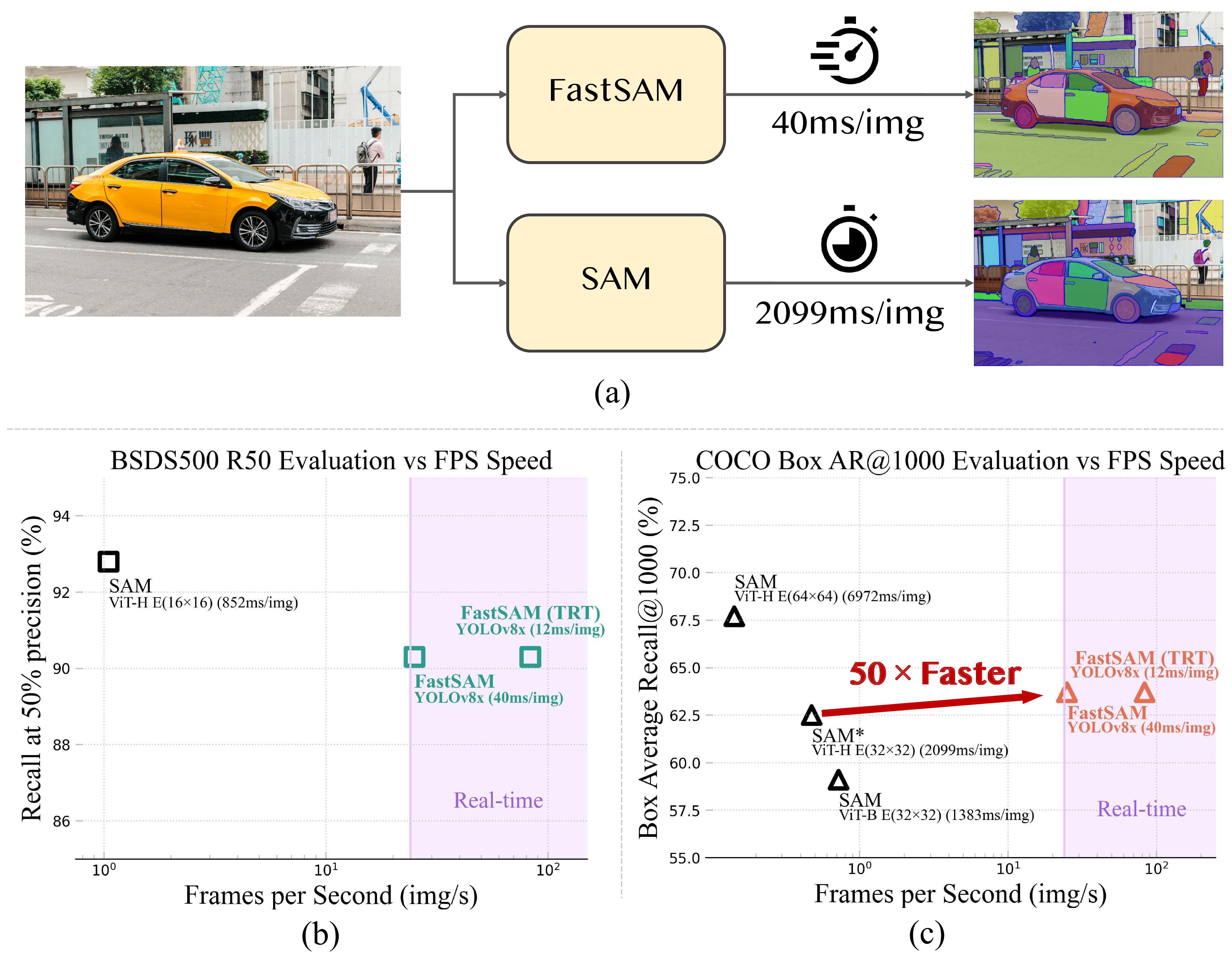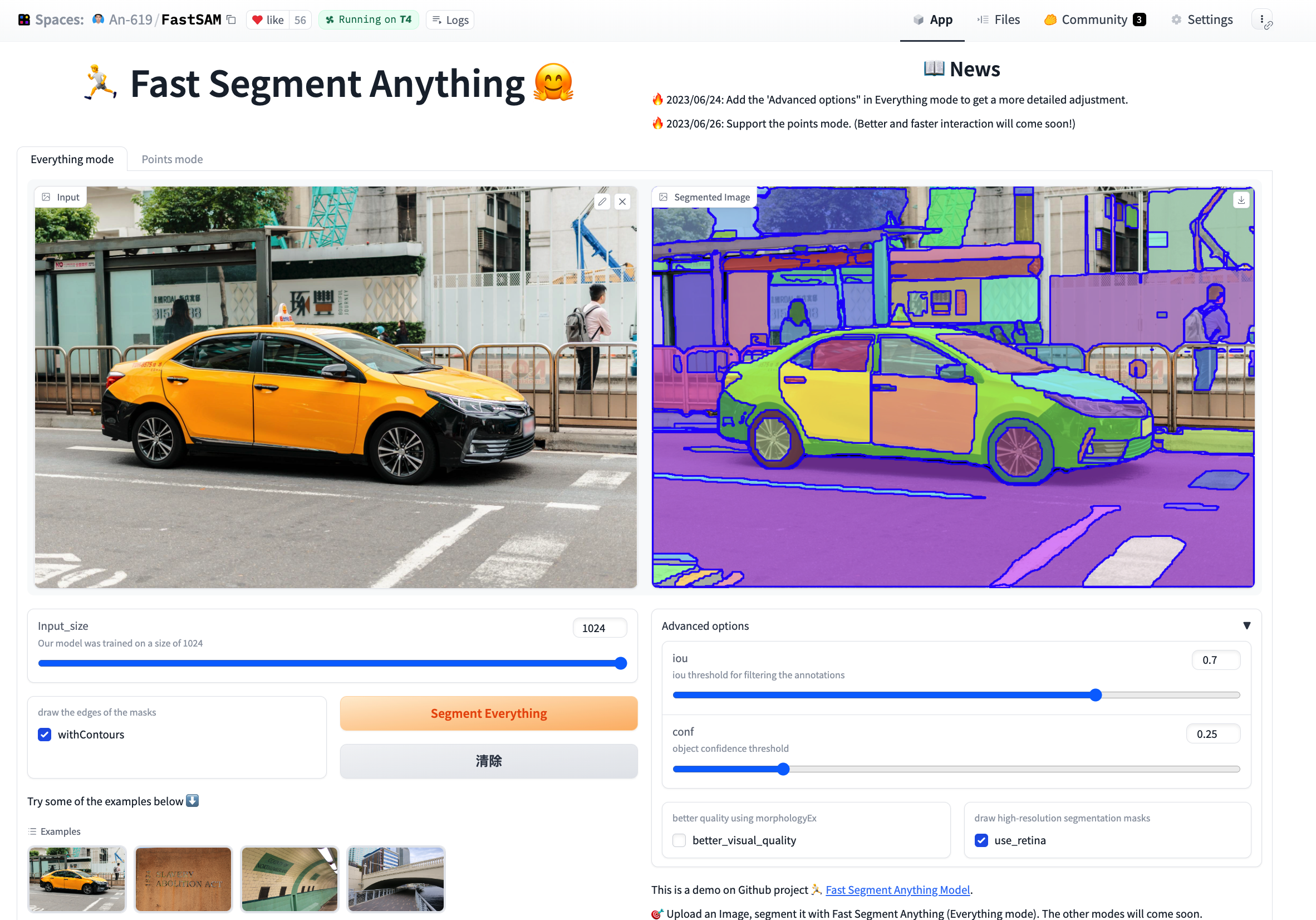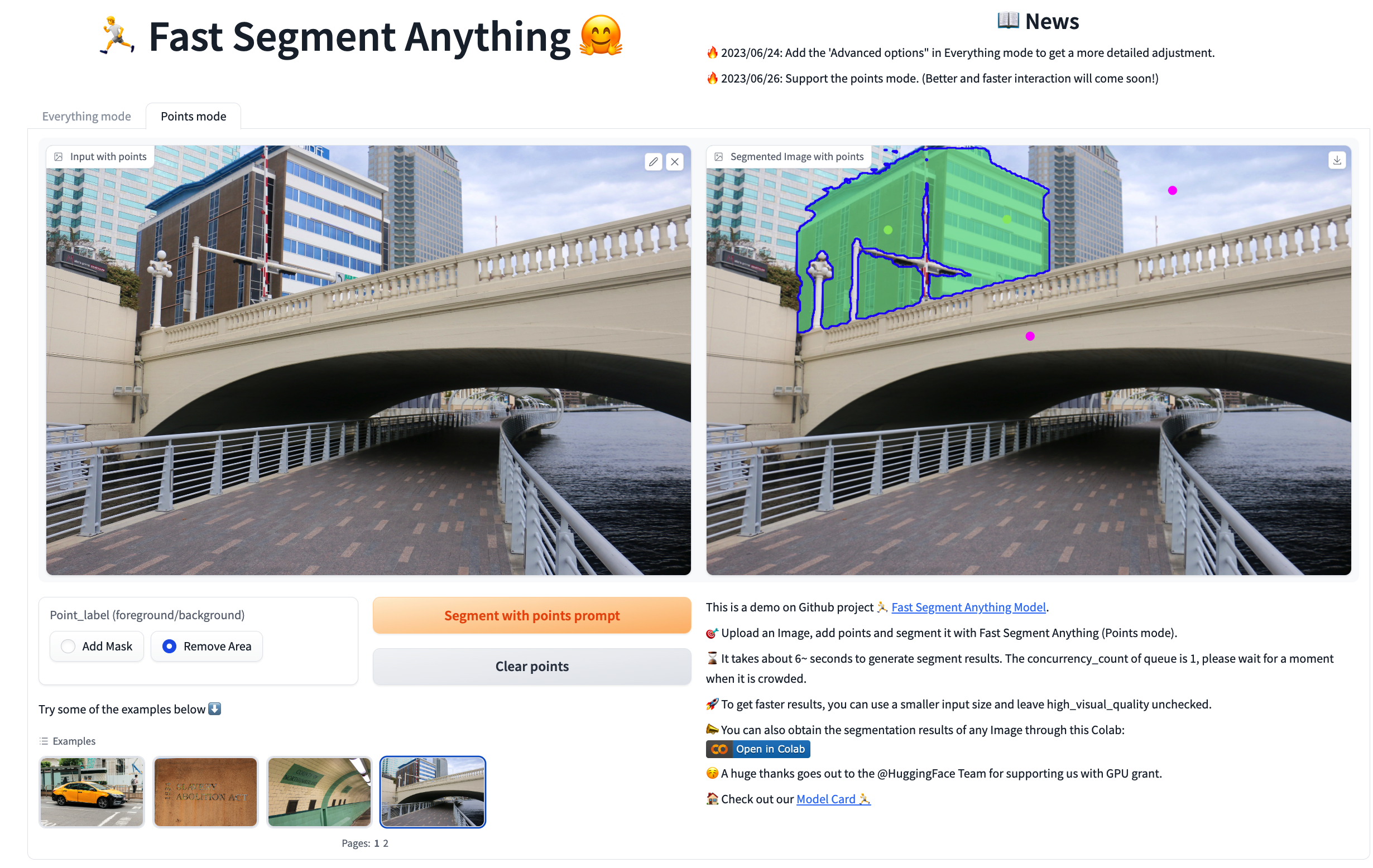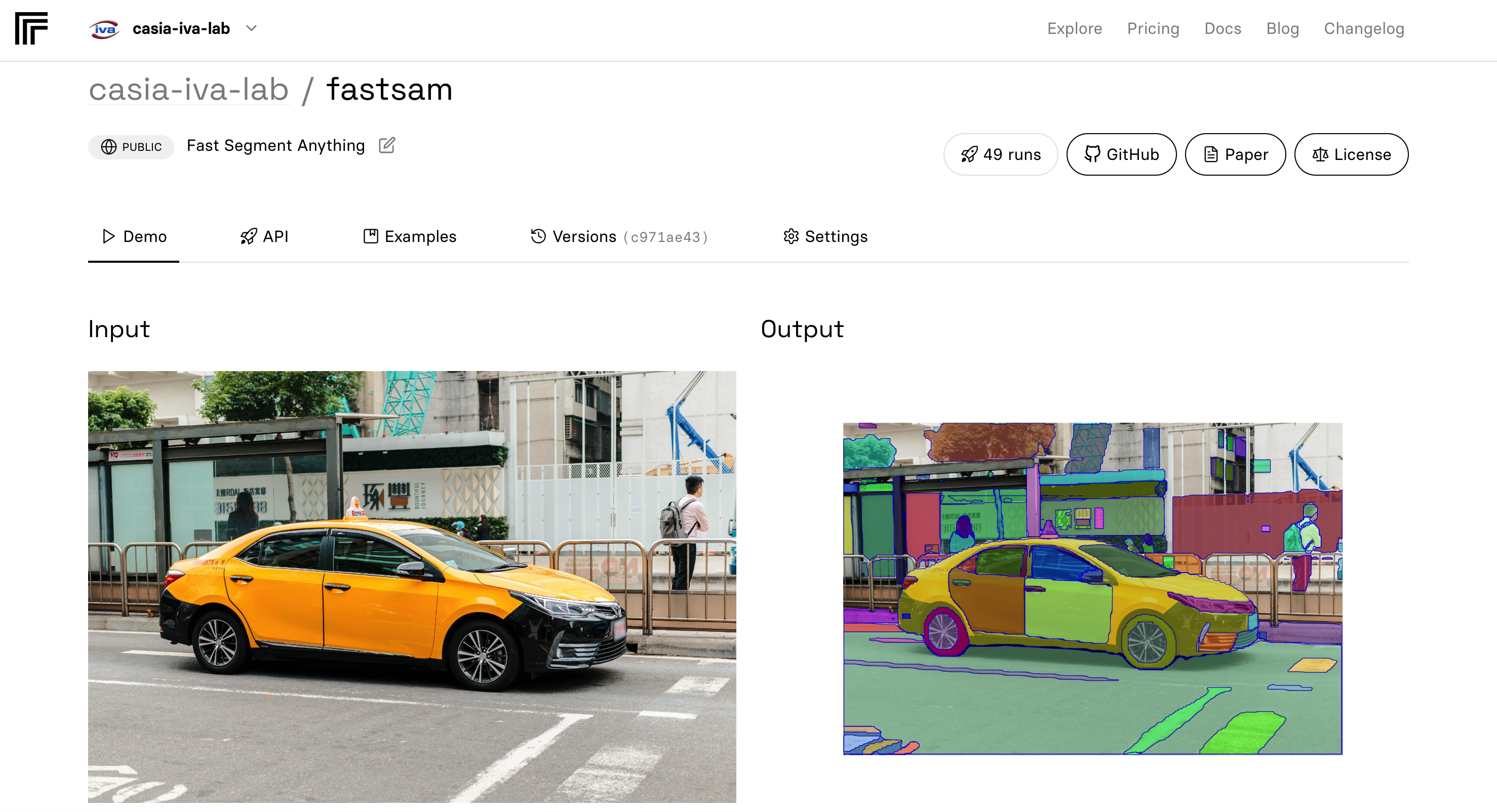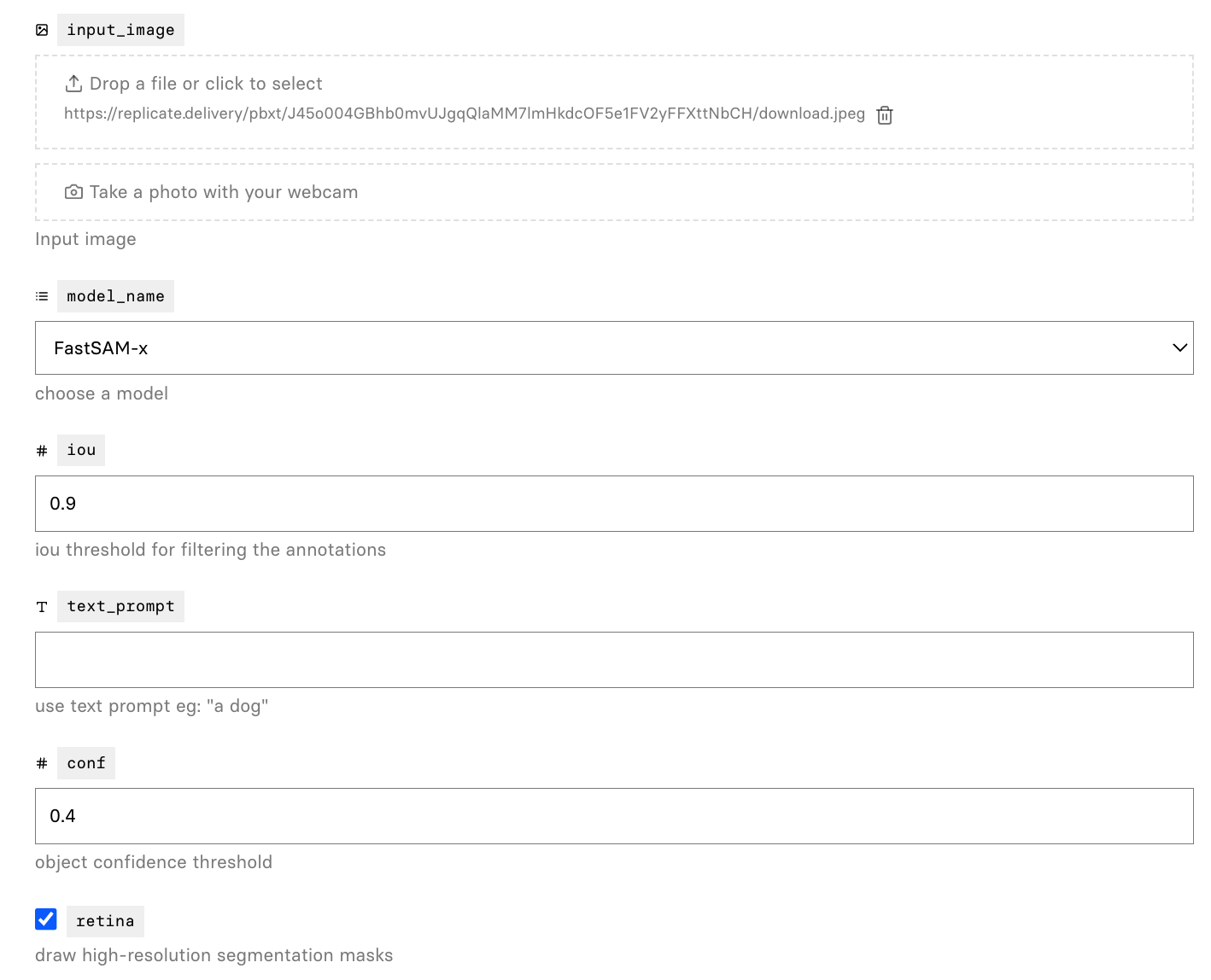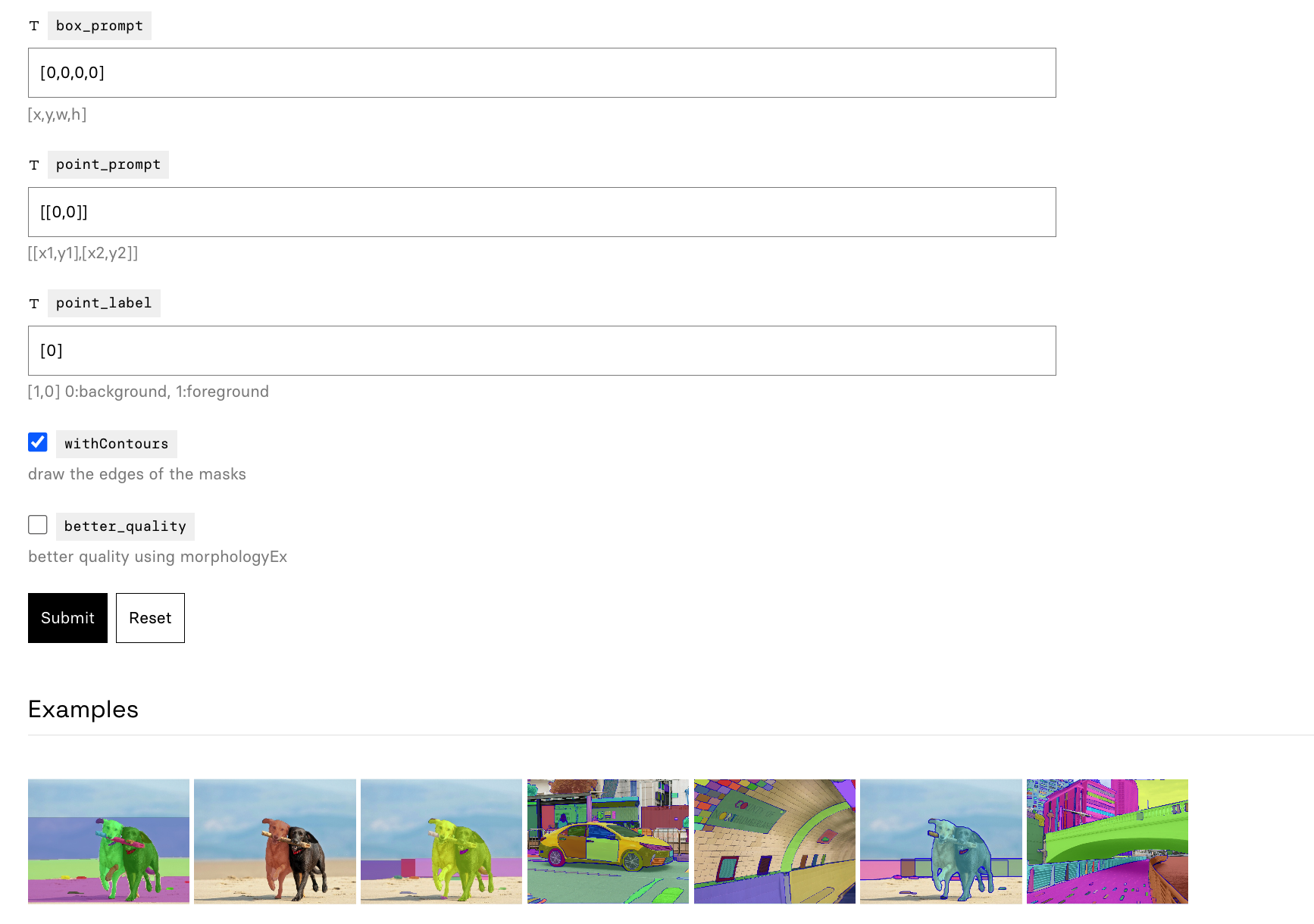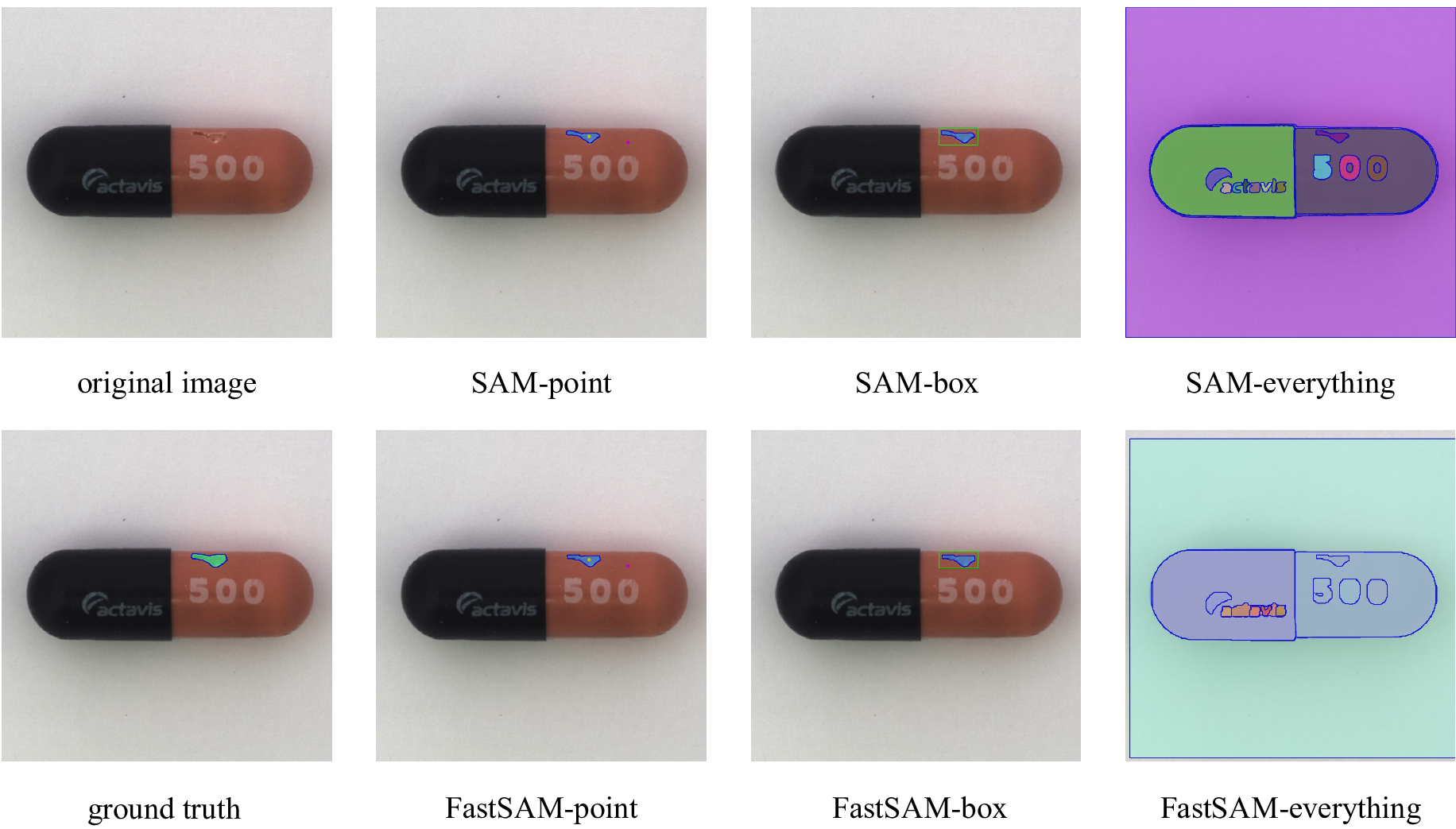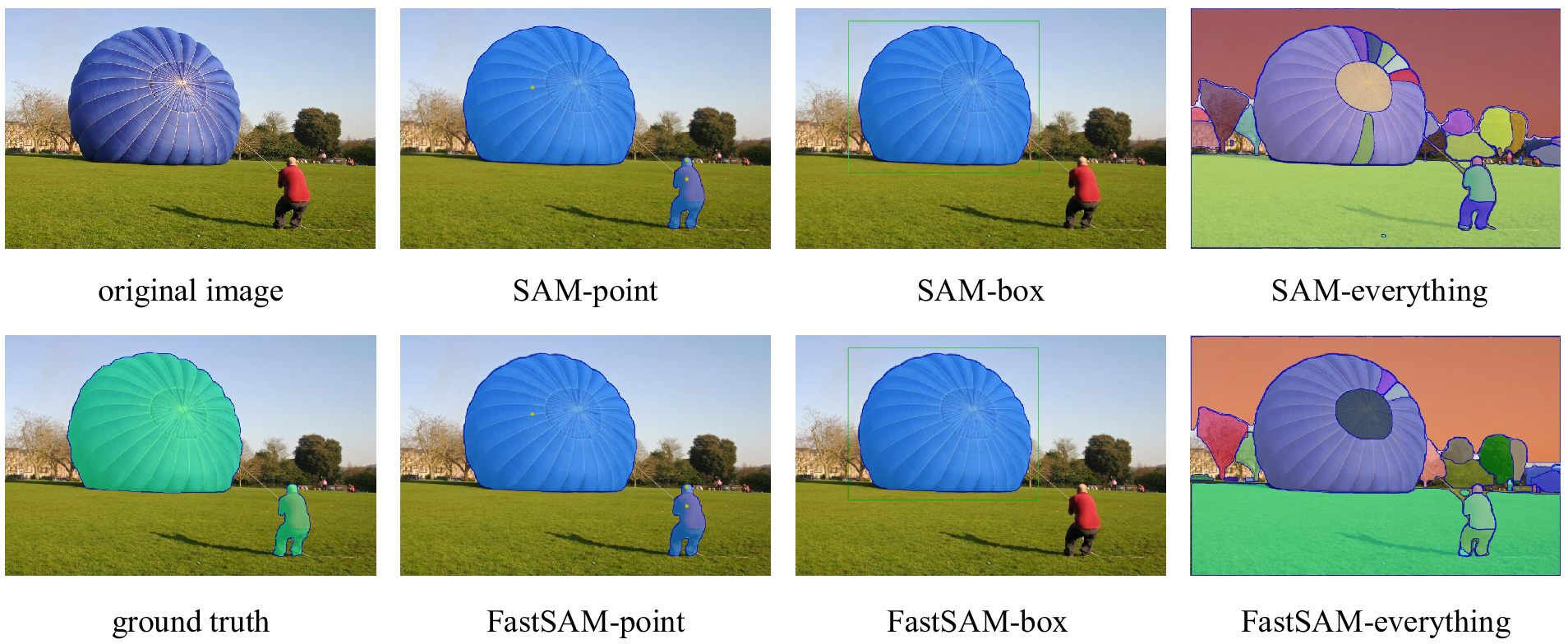[📕Paper] [🤗HuggingFace Demo] [Colab demo] [Replicate demo & API] [Model Zoo] [BibTeX]
The Fast Segment Anything Model(FastSAM) is a CNN Segment Anything Model trained by only 2% of the SA-1B dataset published by SAM authors. The FastSAM achieve a comparable performance with the SAM method at 50× higher run-time speed.
🍇 Updates
2023/06/29Support text mode in HuggingFace Space. Thanks a lot to gaoxinge for help 🌹.2023/06/29Release FastSAM_Awesome_TensorRT. Thanks a lot to ChuRuaNh0 for providing the TensorRT model of FastSAM 🌹.2023/06/26Release FastSAM Replicate Online Demo. Thanks a lot to Chenxi for providing this nice demo 🌹.2023/06/26Support points mode in HuggingFace Space. Better and faster interaction will come soon!2023/06/24Thanks a lot to Grounding-SAM for Combining Grounding-DINO with FastSAM in Grounded-FastSAM 🌹.
Clone the repository locally:
git clone https://github.com/CASIA-IVA-Lab/FastSAM.gitCreate the conda env. The code requires python>=3.7, as well as pytorch>=1.7 and torchvision>=0.8. Please follow the instructions here to install both PyTorch and TorchVision dependencies. Installing both PyTorch and TorchVision with CUDA support is strongly recommended.
conda create -n FastSAM python=3.9
conda activate FastSAMInstall the packages:
cd FastSAM
pip install -r requirements.txtInstall CLIP:
pip install git+https://github.com/openai/CLIP.gitFirst download a model checkpoint.
Then, you can run the scripts to try the everything mode and three prompt modes.
# Everything mode
python Inference.py --model_path ./weights/FastSAM.pt --img_path ./images/dogs.jpg# Text prompt
python Inference.py --model_path ./weights/FastSAM.pt --img_path ./images/dogs.jpg --text_prompt "the yellow dog"# Box prompt (xywh)
python Inference.py --model_path ./weights/FastSAM.pt --img_path ./images/dogs.jpg --box_prompt "[570,200,230,400]"# Points prompt
python Inference.py --model_path ./weights/FastSAM.pt --img_path ./images/dogs.jpg --point_prompt "[[520,360],[620,300]]" --point_label "[1,0]"You can use the following code to generate all masks, make mask selection based on prompts, and visualize the results.
from fastsam import FastSAM, FastSAMPrompt
model = FastSAM('./weights/FastSAM.pt')
IMAGE_PATH = './images/dogs.jpg'
DEVICE = 'cpu'
everything_results = model(IMAGE_PATH, device=DEVICE, retina_masks=True, imgsz=1024, conf=0.4, iou=0.9,)
prompt_process = FastSAMPrompt(IMAGE_PATH, everything_results, device=DEVICE)
# everything prompt
ann = prompt_process.everything_prompt()
# bbox default shape [0,0,0,0] -> [x1,y1,x2,y2]
ann = prompt_process.box_prompt(bbox=[200, 200, 300, 300])
# text prompt
ann = prompt_process.text_prompt(text='a photo of a dog')
# point prompt
# points default [[0,0]] [[x1,y1],[x2,y2]]
# point_label default [0] [1,0] 0:background, 1:foreground
ann = prompt_process.point_prompt(points=[[620, 360]], pointlabel=[1])
prompt_process.plot(annotations=ann,output='./output/',)You are also welcomed to try our Colab demo: FastSAM_example.ipynb.
We provide various options for different purposes, details are in MORE_USAGES.md.
- We also provide a UI for testing our method that is built with gradio. You can upload a custom image, select the mode and set the parameters, click the segment button, and get a satisfactory segmentation result. Everything mode and points mode are now supported for interaction, other modes will try to support in the future. Running the following command in a terminal will launch the demo:
# Download the pre-trained model in "./weights/FastSAM.pt"
python app_gradio.py
- This demo is also hosted on HuggingFace Space.
- Replicate demo has supported all modes, you can experience points/box/text mode.
Two model versions of the model are available with different sizes. Click the links below to download the checkpoint for the corresponding model type.
defaultorFastSAM: YOLOv8x based Segment Anything Model | Baidu Cloud (pwd: 0000).FastSAM-s: YOLOv8s based Segment Anything Model.
All result were tested on a single NVIDIA GeForce RTX 3090.
Running Speed under Different Point Prompt Numbers(ms).
| method | params | 1 | 10 | 100 | E(16x16) | E(32x32*) | E(64x64) |
|---|---|---|---|---|---|---|---|
| SAM-H | 0.6G | 446 | 464 | 627 | 852 | 2099 | 6972 |
| SAM-B | 136M | 110 | 125 | 230 | 432 | 1383 | 5417 |
| FastSAM | 68M | 40 | 40 | 40 | 40 | 40 | 40 |
| Dataset | Method | GPU Memory (MB) |
|---|---|---|
| COCO 2017 | FastSAM | 2608 |
| COCO 2017 | SAM-H | 7060 |
| COCO 2017 | SAM-B | 4670 |
Test on the BSDB500 dataset.
| method | year | ODS | OIS | AP | R50 |
|---|---|---|---|---|---|
| HED | 2015 | .788 | .808 | .840 | .923 |
| SAM | 2023 | .768 | .786 | .794 | .928 |
| FastSAM | 2023 | .750 | .790 | .793 | .903 |
| method | AR10 | AR100 | AR1000 | AUC |
|---|---|---|---|---|
| SAM-H E64 | 15.5 | 45.6 | 67.7 | 32.1 |
| SAM-H E32 | 18.5 | 49.5 | 62.5 | 33.7 |
| SAM-B E32 | 11.4 | 39.6 | 59.1 | 27.3 |
| FastSAM | 15.7 | 47.3 | 63.7 | 32.2 |
bbox AR@1000
| method | all | small | med. | large |
|---|---|---|---|---|
| ViTDet-H | 65.0 | 53.2 | 83.3 | 91.2 |
| zero-shot transfer methods | ||||
| SAM-H E64 | 52.1 | 36.6 | 75.1 | 88.2 |
| SAM-H E32 | 50.3 | 33.1 | 76.2 | 89.8 |
| SAM-B E32 | 45.0 | 29.3 | 68.7 | 80.6 |
| FastSAM | 57.1 | 44.3 | 77.1 | 85.3 |
| method | AP | APS | APM | APL |
|---|---|---|---|---|
| ViTDet-H | .510 | .320 | .543 | .689 |
| SAM | .465 | .308 | .510 | .617 |
| FastSAM | .379 | .239 | .434 | .500 |
Several segmentation results:
The results of several downstream tasks to show the effectiveness.
The model is licensed under the Apache 2.0 license.
- Segment Anything provides the SA-1B dataset and the base codes.
- YOLOv8 provides codes and pre-trained models.
- YOLACT provides powerful instance segmentation method.
- Grounded-Segment-Anything provides a useful web demo template.
Our project wouldn't be possible without the contributions of these amazing people! Thank you all for making this project better.
If you find this project useful for your research, please consider citing the following BibTeX entry.
@misc{zhao2023fast,
title={Fast Segment Anything},
author={Xu Zhao and Wenchao Ding and Yongqi An and Yinglong Du and Tao Yu and Min Li and Ming Tang and Jinqiao Wang},
year={2023},
eprint={2306.12156},
archivePrefix={arXiv},
primaryClass={cs.CV}
}

